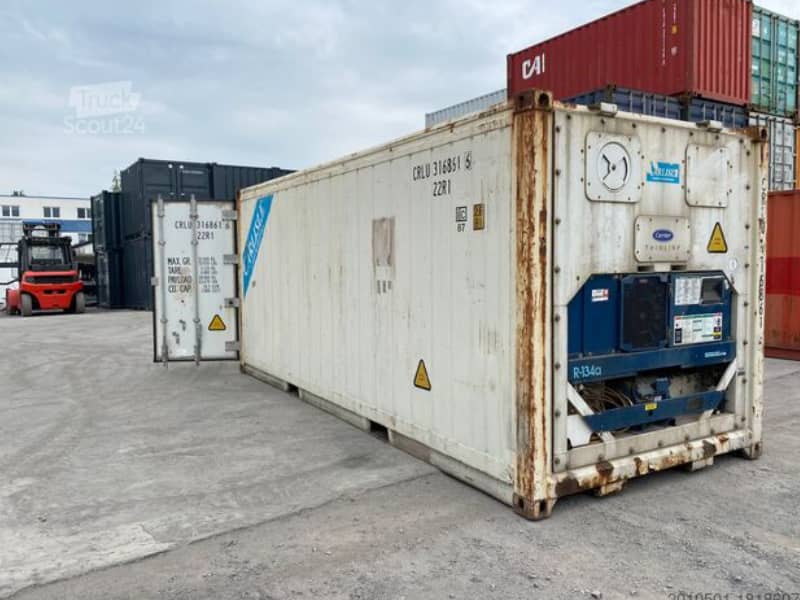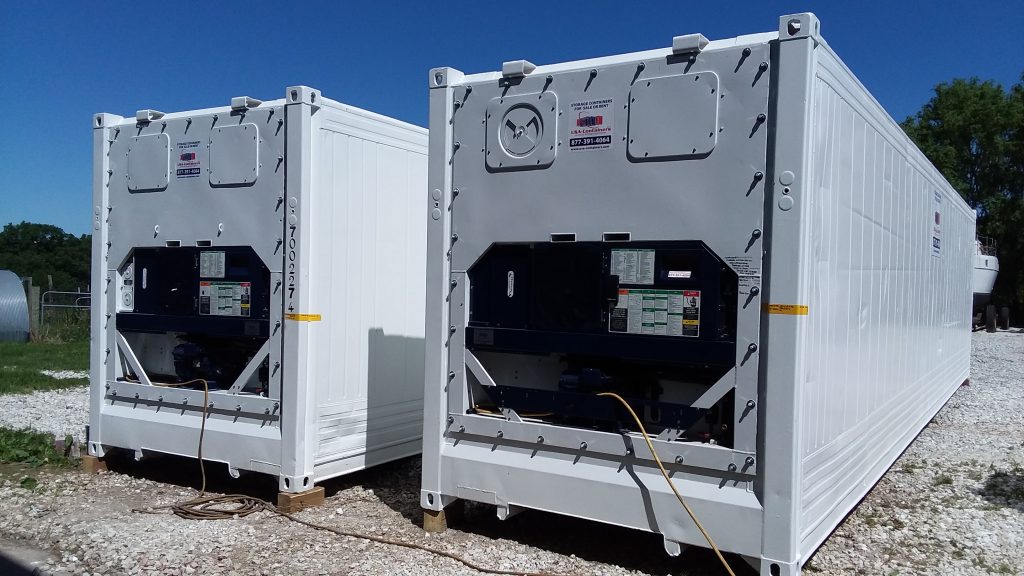Everything About Cold Storage Containers: Necessary Insights for Your Storage Space Needs
Cold storage space containers play a crucial function in the preservation of perishable products. They are available in different types, consisting of refrigerated and shielded devices, each designed for certain storage demands. Recognizing the benefits and key features of these containers is important for services aiming to enhance their operations. As the need for effective storage services expands, checking out the various alternatives readily available can cause educated decisions that affect both earnings and sustainability. What aspects should one take into consideration when selecting the best container?
Kinds Of Cold Storage Containers
Cold store containers can be found in different kinds, each developed to fulfill certain temperature control needs. Amongst one of the most common types are cooled containers, which preserve temperature levels between 0 ° C to 10 ° C, making them suitable for subject to spoiling products like fruits, vegetables, and milk items. An additional type is the deep freezer container, which runs at temperature levels listed below -18 ° C, suitable for long-lasting storage of icy products such as meats and fish and shellfish.
Shielded containers offer temperature security without active cooling, making them helpful for temporary transportation of temperature-sensitive products. Additionally, there are portable chilly storage devices, which offer versatility in places and are usually used in occasions or seasonal operations. Blast chillers rapidly decrease the temperature level of hot foods, guaranteeing safety and top quality. Each type offers a special function in various sectors, from food service to drugs, highlighting the relevance of selecting the appropriate container for particular storage space needs.

Benefits of Using Cold Store Solutions

Cold storage options expand the rack life of things, decreasing waste and boosting profitability for companies. By efficiently handling supply with correct temperature level control, companies can enhance their supply chains and enhance functional performance.
In addition, cold store centers permit versatile storage space alternatives, fitting various volume demands and seasonal variations sought after (used 40ft refrigerated shipping containers). This adaptability aids organizations react swiftly to market modifications
Using cold storage remedies can guarantee compliance with wellness and safety regulations, securing both services and customers. On the whole, the tactical use cold store improves product administration while promoting sustainability and financial feasibility.
Key Attributes to Try To Find in Freezer Containers
When picking freezer containers, numerous key attributes benefit careful factor to consider to safeguard peak performance and integrity. Temperature level control abilities are necessary; containers ought to keep consistent temperature levels suitable for certain goods. Insulation high quality additionally plays a significant role, as remarkable insulation minimizes power consumption and improves temperature level stability.
Next off, convenience of accessibility and loading is important; containers should supply user-friendly styles for reliable handling and company. Toughness is one more important aspect; weather-resistant materials guarantee longevity and secure materials against environmental variables.
Furthermore, flexibility functions, such as built-in wheels or lifting factors, assist in transport, while adjustable designs permit customized storage space services.
Lastly, keeping track of systems, including temperature alarm systems and remote tracking, supply real-time updates, making certain that problems remain suitable. By focusing on these functions, customers can choose cold store containers that meet their functional demands efficiently.
Selecting the Right Freezer Container for Your Requirements
Choosing the right cool storage space container calls for a thoughtful assessment of specific needs and functional demands. Variables such as the kind of products being kept, temperature level sensitivity, and quantity ought to be prioritized. As an example, perishable food products might necessitate containers with rigorous temperature controls, while drugs might call for exact problems to maintain efficacy.
Additionally, potential users must consider the container's size and mobility. A bigger unit may be necessary for bulk storage space, while smaller sized, portable alternatives could be excellent for on-site or temporary requirements. Insulation high quality and power performance are likewise essential, as these will impact functional expenses and temperature level stability.
Conformity with market laws and requirements is important, particularly in markets like food and healthcare. By carefully examining these aspects, users can select a cold store container that effectively satisfies their one-of-a-kind requirements and warranties ideal storage space problems.
Best Practices for Maintaining Cold Storage Space Issues
Maintaining optimal cold store conditions is vital for preserving the top quality and safety and security of temperature-sensitive products. Regularly keeping track of temperature level and humidity levels is essential; utilizing reputable digital thermostats and hygrometers can provide exact readings. Moreover, proper insulation of freezer containers helps minimize temperature fluctuations and energy loss.
Carrying out a first-in, first-out (FIFO) system assures that older inventory is used prior to newer stock, minimizing waste (used 40ft refrigerated shipping containers). Additionally, preserving an arranged format within the storage space permits for better air flow and reduces the threat of cross-contamination
Routine upkeep examine equipment, such as compressors and seals, are very important to avoid breakdowns. Team training on ideal techniques for filling and dumping products assists maintain temperature stability. Keeping doors shut as much as possible limitations warm exchange, guaranteeing that the cool storage environment continues to be efficient and stable in protecting valuable products.
Cost Considerations for Cold Store Solutions
When examining cold storage space services, it is vital to think about the first financial investment expenses alongside recurring operational expenses. A comprehensive break down of these prices can disclose substantial lasting savings possibility for companies. Understanding these financial facets assists stakeholders make notified choices regarding their cold store needs.

Preliminary Financial Investment Costs
The monetary landscape of cold store containers offers different initial investment prices that companies have to think about. These prices commonly include the purchase or rental price of the containers, which can vary based upon insulation, type, and dimension top quality. Furthermore, costs associated with retrofitting existing frameworks to accommodate freezer should be factored in, specifically if specialized equipment is called for. Installment prices, including electric job and refrigeration systems, also add to the overall initial financial investment. Services ought to not overlook transportation costs for providing containers to their wanted area. Prospective customization choices, such as shelving or temperature level monitoring systems, can further influence the preliminary financial outlay. Mindful budgeting for these factors is important for successful cold store execution.
Functional Expenses Breakdown
Operational expenses for freezer solutions include several important cost considerations that companies must navigate. official statement Secret factors include energy costs, which can be significant due to the need to preserve reduced temperature levels. Maintenance expenses are also considerable, as normal maintenance is necessary to ensure equipment operates successfully and stays compliant with health and wellness criteria. Additionally, labor costs might occur from the need for specialized team to check the storage space and take care of atmosphere. Insurance policy expenditures are one more factor to consider, as companies have to secure their financial investments against prospective losses. Lastly, any type of potential regulatory conformity costs need to be factored in, as businesses might require to spend in systems that adhere to food safety and ecological policies. Understanding these expenses is essential for effective budgeting.
Long-Term Savings Possible
Purchasing freezer remedies supplies substantial long-lasting financial savings capacity, transforming initial expenditures right into economic effectiveness gradually. By decreasing putridity and waste, organizations can enhance their revenue margins click to find out more substantially. Advanced insulation and energy-efficient systems decrease energy prices, which accumulate over the life-span of the tools. Cold storage space containers typically call for much less constant maintenance contrasted to standard refrigeration techniques, leading to reduced repair expenditures. The capacity to store items for prolonged durations without jeopardizing high quality enables organizations to take advantage of market fluctuations, maximizing revenue. Additionally, the scalability of chilly storage space solutions makes it possible for firms to adjust to changing demands without incurring excessive expenses. In general, these aspects add to a compelling situation for freezer as an affordable financial investment strategy.
Often Asked Questions
How Much Time Can Food Be Kept in Cold Storage Containers?
The duration food can be kept in cold storage containers varies by type. Usually, subject to spoiling items last from days to weeks, while frozen foods can remain safe for months, depending on proper temperature level and storage problems.
Are Freezer Containers Energy-saving?
The power effectiveness of cold store containers differs based upon style and insulation top quality. Modern devices commonly make use of innovative innovation to reduce power consumption, ultimately adding to reduced operational costs and ecological influence in long-lasting usage.
Can Freezer Containers Be Customized for Specific Requirements?
Cold store containers can certainly be customized to meet particular needs. Modifications might consist of temperature level controls, dimension modifications, and extra features, enabling individuals to tailor options successfully for various storage demands and operational preferences.
What Are the Typical Dimensions of Freezer Containers?
Cold storage space containers commonly come in standard sizes such as 10, 20, and 40 feet. These dimensions accommodate numerous storage space demands, ensuring versatility for companies needing temperature-controlled atmospheres for delicate materials or subject to look at this site spoiling products.
Do Freezer Containers Require Unique Authorizations for Use?
Cold store containers typically require special authorizations for usage, depending upon neighborhood laws and meant applications. Authorities may mandate permits to ensure safety and security requirements, environmental compliance, and proper operational practices are preserved throughout their usage.
Cold storage space containers come in different kinds, each developed to satisfy specific temperature control demands. In addition, cold storage centers permit for adaptable storage alternatives, suiting different volume demands and seasonal fluctuations in demand. Selecting the best chilly storage container needs a thoughtful evaluation of certain needs and operational needs. The financial landscape of cool storage space containers offers various preliminary investment expenses that organizations should consider. Cold storage containers can certainly be customized to meet details needs.